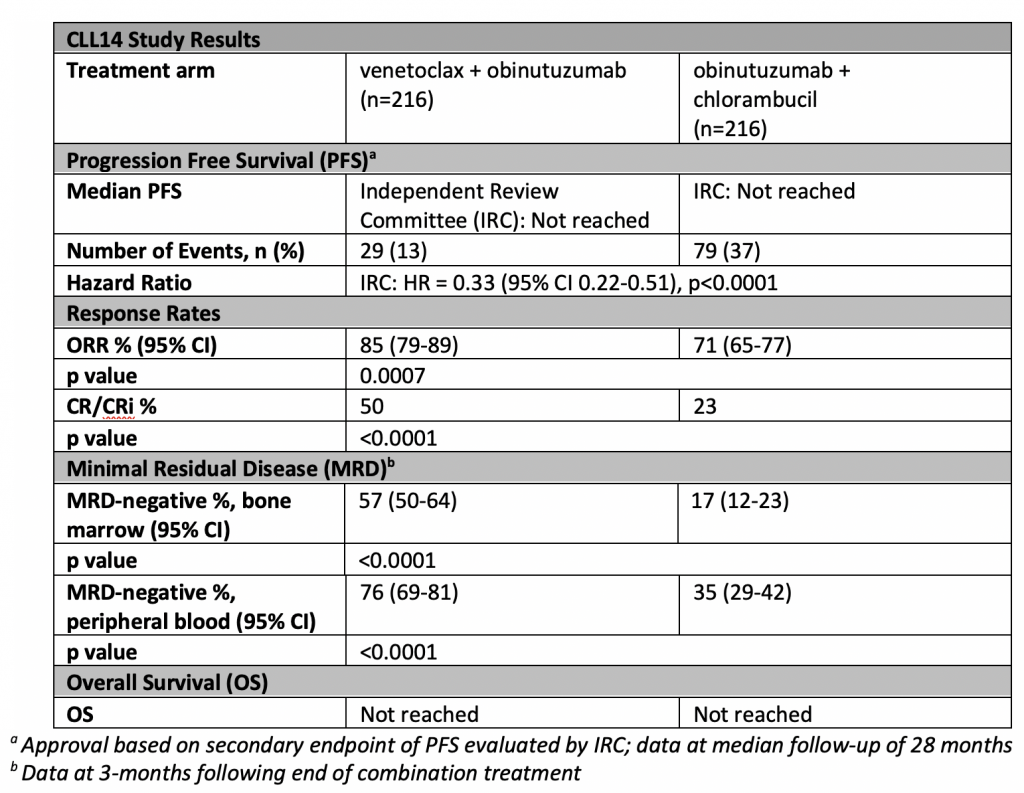This is very big news.
This is the first non-chemotherapy based fixed duration treatment for CLL in treatment naïve patients.
Until this approval, the only viable approved treatments were fixed duration chemotherapy or taking ibrutinib until progression or side effects force you off.
Of course, venetoclax and obinutzumab could have been and have been used together “off label” as they are both already approved medications, but now insurance will have no excuse not to pay for it. And doctors less familiar with treating CLL should feel comfortable with an another strong option for a first therapy.
The Phase III study was done by the well-respected German CLL study group lead by Prof. Hallek out of Cologne.
Here is a link to the Abbvie press release.
Below is part of the press release from Genentech who is co-developing venetoclax with Abbvie
About the CLL14 Study
CLL14 (NCT02242942) is a randomized Phase III study evaluating the combination of fixed-duration venetoclax plus obinutuzumab compared to obinutuzumab plus chlorambucil in patients with previously untreated chronic lymphocytic leukemia (CLL) and co-existing medical conditions. 432 patients with previously untreated CLL were randomly assigned to receive either a 12-month duration of Venetoclax alongside six-month duration of Obinutuzumab (Arm A) or six-month duration of obinutuzumab plus chlorambucil followed by an additional six-month duration of chlorambucil (Arm B). Arm A started with an initial cycle of obinutuzumab followed by a five-week venetoclax dose ramp-up to help reduce tumor burden. The primary endpoint of the study is investigator-assessed progression-free survival (PFS). Secondary endpoints include PFS assessed by Independent Review Committee (IRC), minimal residual disease (MRD) status, overall response (OR), complete response (with or without complete blood count recovery, CR/CRi), overall survival (OS), duration of response (DOR), event-free survival (EFS), time to next CLL treatment (TTNT), and safety. The CLL14 study is being conducted in cooperation with the German CLL Study Group (GCLLSG), headed by Michael Hallek, M.D., University of Cologne.
The most common adverse reactions with Venetoclax plus Obinutuzumab were low white blood cell count (neutropenia), diarrhea, fatigue, nausea, low red blood cell count (anemia), and upper respiratory tract infection.
Comments:
This is a powerful new option for patients to consider. Just how durable these responses will be remains to be determined, but the depth of the remissions with ¾ of patients reaching U-MRD (undetectable minimal disease or less than one CLL cell per 10,000 white blood cells) in the peripheral blood and 56% in the bone marrow bodes well for lengthy responses. What we patients want to see if very durable PFS (progression fee survival) and OS (overall survival), and the early results are promising.
Moreover, hopefully this is the first of many such approvals of fixed duration combinations that will be coming over the next few years that could revolutionize how CLL is treated. And of course, the approval raises the question as to which combos and sequences are best.
Exciting times for us patients.
Brian Koffman, Chief Medical Officer, CLL Society


















